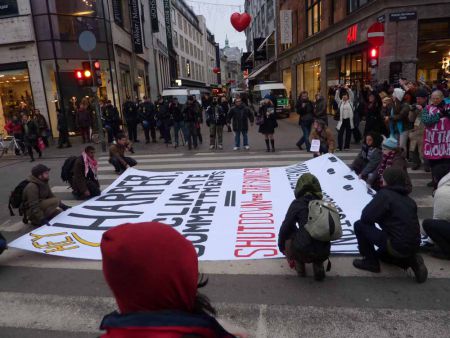As international delegates resumed negotiations for a global plan to address climate change at the Bella Centre in the outskirts of Copenhagen, Canadian and American Indigenous groups led a rally outside the Canadian Embassy in the city center calling for Prime Minister Stephen Harper to shut down the Athabasca tar sands, Canada's greatest single contributor to domestic greenhouse gas, and the largest industrial project in history.
Indigenous Environment Network (IEN) member Clayton Thomas-Muller drummed and sang as others unfurled a six-by-six-foot "welcome mat" in the middle of an intersection. At each break in song, the carpet-carriers hurried the banner off the street in order to let traffic pass, and as the song resumed they rotated the mat ninety degrees and returned it to the intersection. They did this four times: once in each cardinal direction. The carpet read: "Hey, Harper: Climate Commitments = Shut Down The Tar Sands! Indigenous Rights Now." It was intended as a welcome message to the PM, who arrives in Copenhagen Thursday, December 17.
One hundred fifty people – "Two hundred, including reporters!" according to Copenhagen police – gathered to express solidarity with this message. In attendance were writer and anti-globalization activist Naomi Klein, and Council of Canadians National Chair Maude Barlow.
None are so passionate in opposition to tar sands development as Indigenous activists from Canada and the US. "The lifeline of [tar sands] oil – from where it is mined to where it is piped to where it is refined – runs through poor communities of colour," said Mari Rose Taruc of the Asian Pacific Environmental Network (APEN). The primary target of APEN's work has been Chevron Oil's refinery in Richmond, California's biggest climate polluter and outspoken opponent to climate change legislation. The refinery has attempted to retool its plant to process tar sands oil from Alberta.
Taruc's comment addressed the louder and deeper message that Indigenous delegates and activists in Copenhagen wanted to send to the Canadian government on Monday. While the global environmental implications of tar sands development are undoubtedly dire and widespread, it is Indigenous people from Northern Alberta to California who are impacted most directly and seriously.
"In addition to demanding that he shut down the tar sands, we are sending a message to Harper to respect treaties, agreements that the country of Canada has signed with Indigenous people," said Eriel Deranger of the Rainforest Action Network (RAN), whose family lives in Fort Chipewyan, a community downstream the Athabasca River from tar sands development. People in Fort Chip have been developing rare forms of cancer in alarming numbers; their water contains high levels of arsenic and fish and fowl are contaminated with mercury and polycyclic aromatic hydrocarbons.
Deranger delivered a basket of "goodies" to Harper at the embassy, which was accepted by an embassy representative. The basket contained a copy of the Kyoto Protocol (Canada's non-compliance of its pledged targets are infuriating most of the Least Developed Countries (LDCs) most threatened by global warming); a copy of the United Nations Declaration on the Rights of Indigenous Peoples (http://www.un.org/esa/socdev/unpfii/en/drip.html) (which Canada has refused to sign), the several treaties between Canada and Indigenous peoples that are violated by the tar sands project; and a grab-bag of "shut down the tar sands" swag.
Among the members of the Indigenous delegation who are accredited to attend events at the Bella Centre are twenty-three individuals from tar sands-affected communities. Deranger says the delegation is lobbying for climate negotiators to integrate the wording of the Declaration into its final text.
Ben Powless of IEN agrees that achieving this task is the key goal for the delegation.
"We have managed to achieve some gains in terms of getting wording [in the text] that would never have been considered years ago," he said via email. "But this is still contested by a number of countries, including the United States and Canada, from what we hear. Other countries have risen above their domestic politics, however, and understand the urgency to support Indigenous peoples to protect their lands, territories and resources."
The protest was organized by IEN, RAN, the Indigenous People's Power Project and the Council of Canadians. More than fifty Danish police officers attended the event. They brought ten vans and three paddy wagons and blocked access to the Embassy. The rally was peaceful, although afterward Thomas-Muller complained good-naturedly that the Copenhagen police contacted him on his way to the rally to insist that he cancel the protest, as it coincided with another march.
"I told them, man, I can't call it off now," he said, laughing. "We're already here!"
***
Background on the Tar Sands and Canada’s Climate Record
Canada certainly has a presence in Copenhagen, although not in the same spirit as Thomas-Muller intended.
The True North is being singled out in Copenhagen during this year's United Nations Framework Convention on Climate Change (UNFCCC) 15th Conference of the Parties (COP15) as being a disappointing roadblock to an international agreement on emissions targets that scientists say are necessary to avert a global climate crisis.
Canada entered the talks with a bad rap, having failed to meet the emissions-reduction targets it agreed to in 1997 when Jean Cretien signed the Kyoto Protocol. And Canada's can't look to the oil in Alberta to explain non-compliance with Kyoto. Failure with Kyoto predates the tar sands, according to Elizabeth May, leader of Canada's Green Party.
"We didn't reach Kyoto because we never tried. The first serious climate plan was years late -- April 2005. It would have reduced emissions, not as much as is necessary. But Harper canceled it in spring 2006 and also announced a repudiation of our Kyoto targets," said May in an email.
"As a ratifying party, we were the only one to break the law."
It's gone downhill from there. Canada won two of the possible three "Fossil of the day" awards on Friday, and a total of eight so far. Fossil winners are nominated and voted on by non-governmental organization (NGO) delegates based on a country's particularly poor performance at the climate negotiations that day. One of Canada's awards Friday was for the emissions target Canada's chief negotiator, Michael Martin, tabled: three per cent below 1990 levels. Most developed countries are negotiating in the range of 10-25 per cent. The Intergovernmental Panel on Climate Change (IPCC) is calling for countries to pledge a 25-40 per cent reduction on emissions below 1990 levels by 2020, and 80 per cent by 2050.
The Fossil was more for Martin's claim that the three per cent number is "based on science" than for its low value. Toronto mayor David Miller accepted the award on behalf of Canada.
Canada was the subject of one of four articles in Friday's ECO, the NGO newsletter releasing results and analysis from the negotiations each day, which criticized Canada's negotiators for failing to come to Copenhagen with a comprehensive plan for domestic emissions reductions. "'Waiting for the US' is not a plan," chided the article's author. "Nor is 'massively expanding the tar sands.'" Canada made the "What's Not" column of "What's Hot" in Wednesday's Climate Chronicle, a newsletter released by Carbon Trade Watch, the Institute for Security Studies and Earthlife Africa. And Canada was the only country referred to negatively in Monday evening's uplifting speech by Bill McKibbins, leader of the 350 movement. In the midst of complimenting country after country for involvement in 350 and other environmental actions, he said Canada is "the greatest climate culprit" of the Copenhagen negotiations, especially with regards to development of the tar sands -- by now a buzzword in Copenhagen.
Canada began on the wrong foot in terms of climate conscientiousness, and the footprint has been expanding rapidly. Presently, Canadians have the largest carbon footprint per capita on earth, out-burning even our oil-thirsty southern neighbours. This time we can point to northern Alberta for an explanation.
"Tar sands are the major reason our emissions [have grown] more (proportional to our economy) than those of the US," said May. "By about 2006, the US was up 16 per cent [in emissions]. Canada: 26. That difference was the tar sands."
A press release from the office of Jim Prentice, Minister of the Environment, announced Monday that Canada had pulled an about-face in its position on emission targets and "climate debt." Shortly thereafter, the Wall Street Journal (http://europe-wsj.com/article/SB1000142405274870420140457459045317699603...) published a web article covering Canada's change in position. A COP15 web page featured a video of a press conference showing the Ugandan delegation congratulating Canada. All this was part of a stunt pulled by popular spoof troupe the Yes Men, aimed at Canada's unpopular line in Copenhagen. An hour later a response to the spoof from the Department of the Environment claimed the hoax was "short-sighted" and risked "heavily damaging the negotiating process," and that the tar sands "are enabling Canada to meet ambitious emissions goals by providing her, as well as her neighbors, with the energy resources needed to transition to a cleaner energy future." This too was part of the spoof.
Correspondence from Prentice's office continued to be suspect late into the day Monday.
To the exasperation of Lesser Developed Countries (LDCs) (which have the most to lose in these negotiations) and developed countries that have agreed to aggressively curtail emissions, (the real) Canada will not budge on its low targets. "We have not changed our position a bit," said May, "except that due to cabinet leaks we know Canada does not mean to even hit the weak targets they set out."
Canada received another Fossil yesterday, this time for lying about its “scientific” target.
----
Photographs by Christopher Cohoon.




